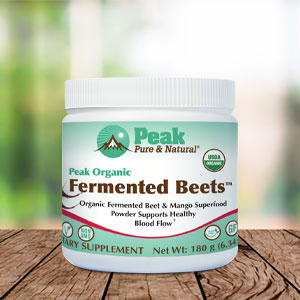Get Easy Health Digest™ in your inbox and don’t miss a thing when you subscribe today. Plus, get the free bonus report, Mother Nature’s Tips, Tricks and Remedies for Cholesterol, Blood Pressure & Blood Sugar as my way of saying welcome to the community!
The nutrient deficiency that leads to bone-hard arteries

When you’re online, have you come across those ads that say something to the effect of, “Throw out this one food,” or “Don’t eat this,” and there’s a cartoonish drawing of a banana?
I don’t know what they’re selling or even if they are really disrespecting my favorite fruit or not — because I’ve never clicked the ad — but I hope most people realize that they should be eating bananas…
Especially if you want to avoid hardening of your arteries.
Potassium and your heart
Potassium is a nutrient that we’ve known for a long time is important for heart health — especially to help keep your heart muscles strong and beating regularly.
Too little can result in heartbeat irregularities which can be dangerous, even resulting in sudden death. But potassium’s ability to help keep your heart in rhythm isn’t the only reason it’s a vitally important nutrient…
Often, when we hear of “hardening of the arteries,” we think of plaque buildup and blockages within the arteries — clogged arteries, known medically as atherosclerosis. In this condition, the arteries narrow and become hard because of what’s on the inside clogging them and building blood pressure.
But, some shocking and recent research shows that without sufficient potassium, your arteries may actually turn to bone.
Scientists at the University of Alabama at Birmingham discovered this alarming transformation when they looked at the endothelial lining, or vascular muscle cells, in the arteries of mice fed a low-potassium diet…
At the cellular level, low potassium levels prompted the expression of gene cells that are hallmarks of bone cells — and decreased the gene expression of vascular smooth muscle cells. In other words, the smooth cells of the arteries actually changed into bone-like cells.
When this happens, there’s no way to reverse it, and stroke or heart attack won’t be far behind.
A banana a day could keep a heart attack away
In this country, someone suffers a heart attack every 44 seconds — and the fact that most Americans eat a Western diet featuring too few potassium-rich vegetables is at least part of the reason.
Of course, you could take potassium supplements, but I think this is one nutrient where you really should try to get what you need from whole foods — unless you have a heart condition and your doctor has you on potassium tablets to counteract a potassium-depleting cardio medication.
And, there are quite a few others to be aware of… including antacids, gout and anti-inflammatory medications, diuretics, laxatives and some antibiotics. If you regularly take any of these medications, you may want to get your levels checked.
It’s no secret, now, that I really like bananas. I usually have at least one a day as part of my breakfast routine. And even though they are a good source, that just gets me to about 10 percent of the daily value (DV) which is 4,700 mg.
Fortunately, a lot of good-tasting, nutrient-rich foods pack a potassium punch… Try these, based on one-cup servings:
- Beets, for 11 percent DV
- Sweet potatoes, for 12 percent DV
- Watermelon, for 14 percent DV
- Black beans, for 16 percent DV
- Avocados, for 20 percent of DV
- Tomato sauce, for 20 percent DV
- Swiss chard, for 20 percent of DV
- White beans, just one cup will get you almost a quarter of the way to DV
You’ll notice I put beets a the top of the list, even though they aren’t the highest potassium source in the list. But it’s because beets offer an extra layer of protection for your arteries — they are a natural vasodilator. Beets help your body create nitric oxide with helps your arteries widen for better blood flow.
A revelation affirmed
Because I’ve written previously about cholesterol’s erroneous ties to heart disease, I want to drive this point home:
For decades, cholesterol was vilified as the substance responsible for clogging and hardening arteries and causing heart attacks. Many of our contributors have written more than once that LDL-cholesterol very poorly relates to heart attack risk and referenced several studies that indicate cholesterol is not the cause of heart disease…
In the more recent past, we learned that calcium plaque build-up was clogging arteries, not cholesterol…
And now, thanks to this research, we see that a lack of a vital nutrient — potassium — can transform our arteries basically into bone.
Understanding the real threats to heart health is not only enlightening and life-saving, it reaffirms that it’s not only OK to listen to health advisors that go against the grain… but it’s probably a good idea…
Because even with this latest revelation, your doctor is still going to push cholesterol-robbing drugs on you that increase your risk for diseases, like Parkinson’s and type 2 diabetes, weaken your muscles and steal your memories.
If you have high blood pressure or heart problems, they’ll likely keep recommending the same old heart medications known to leach potassium from your body.
It’s a vicious cycle that perpetuates illness and establishment medicine. As for me, I’ll keep eating my potassium-rich fruits and vegetables and taking my vitamin K2.
Editor’s note: There are perfectly safe and natural ways to decrease your risk of blood clots including the 25-cent vitamin, the nutrient that acts as a natural blood thinner and the powerful herb that helps clear plaque. To discover these and other secrets of long-lived hearts, click here for Hushed Up Natural Heart Cures and Common Misconceptions of Popular Heart Treatments!
Source:
- Yong Sun, Chang Hyun Byon, Youfeng Yang, Wayne E. Bradley, Louis J. Dell’Italia, Paul W. Sanders, Anupam Agarwal, Hui Wu, Yabing Chen. Dietary potassium regulates vascular calcification and arterial stiffness. JCI Insight, 2017; 2 (19) DOI: 10.1172/jci.insight.94920














